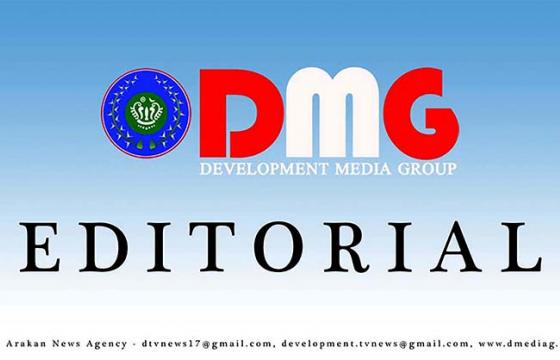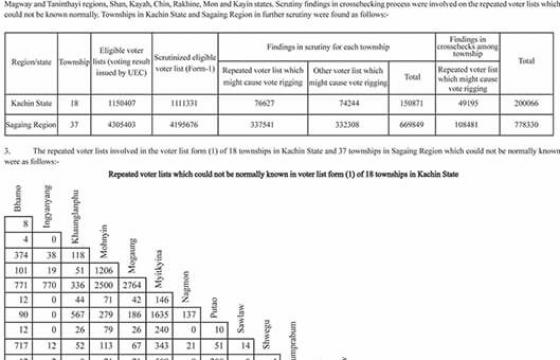The month of April hasn’t yet end, but quite a lot of important happening has already taken place, which might be crucial in shaping the political future of the country.
They are: the April 1, by-elections; April 6 to 11 President Htin Kyaw’s China visit; March 14 to April 7, Karen National Union (KNU) Congress; April 8 to 9 United Nationalities Federal Council (UNFC) and Nationwide Ceasefire Agreement (NCA)-signatory 7 Ethnic Armed Organizations (EAOs) meeting; April 11, Peace Talks discussion between the State Counselor and the rural youth at Myanmar International Convention Center in Naypyitaw; and April 15 ongoing in Pangkham conference among NCA-non-signatory 7 EAOs.
Now let us look at briefly on each of the happening a bit to later determine on how they could impact on the peace process situation as a whole.
By-election
The by-election for 19 seats in Burma’s parliament were held on April 1, 2017, which was contested by 94 candidates [18 each from the Nationalities League for Democracy (NLD) and Union Solidarity Development Party (USDP), 51 from different ethnic political parties and seven individual candidates] from 24 political parties.
Accordingly, the NLD secured nine (47 percent) out of 19 vacant constituencies, followed by the Shan Nationalities League for Democracy (SNLD), with six seats (32 per cent), the Union Solidarity and Development Party with two seats (11 per cent) and the Arakan National Party (ANP) and the All Nationalities Democracy Party (ANDP) with one seat (5 percent) each. (Source: Asia Foundation – April 12, 2017)
President Htin Kyaw’s China visit
President Htin Kyaw’s China visit from April 6 to 11 was generally taken as a successful trip, as he held bilateral talks with President Xi Jinping and met with Premier Li Keqiang of the State Council, and Chairman Zhang Dejiang of the Standing Committee of the National People’s Congress separately on April 10, 2017, followed by the two leaders (Presidents) attending the signing ceremony of cooperation agreements between Myanmar and the People’s Republic of China.
“A total of (9) MoUs, Agreements and Exchange of Letters were successfully inked, namely Agreement on China’s grant for economic and technical cooperation of RMB Yuan (1) billion to Myanmar to implement projects in economic developments and living standard improvement of Myanmar people including education, rural development and other fields; Cooperation in the Field of Forestry; Cooperation in Seafarers Training, Education and Development; Cooperation in Medical Technic Training Centre and Disease Control; Technical Cooperation Project Regarding the 29th South East Asian Games; Crude Oil Transportation Agreement and implementation of Development of Deep Sea Port Project and Industrial Park in Kyauk Phyu Special Economic Zone,” according to the press release issued by the Myanmar Ministry of Foreign Affairs of April 13, 2017.
“Furthermore, they discussed on the matters of maintaining peace and stability and development of the border areas, continuation of China’s constructive support for the peace process of Myanmar and further pursuance of 2+2 high level consultations led by Ministry of Foreign Affairs and Ministry of Defense. China also expressed its support toward Myanmar Government’s efforts for the national reconciliation and peace, promoting democratic transition, improving socio-economic lives of the Myanmar people,” according to the press release.
The outstanding point to be noticed is that the mentioning of the leaders also cordially discussed about the ongoing infrastructure projects including oil and gas pipelines and Kyauk-Phyu Special Economic Zone and Deep Sea Port.
Apart from that the usual diplomatic niceties such as “the importance of advancing “Comprehensive Cooperative Strategic Partnership Relations” based on the Five Principles of Peaceful Co-existence and existing “Pauk-Phaw” friendship; promoting diverse cooperation between the two countries particularly for the benefit of the two peoples,” were stressed.
16th KNU Congress
The KNU 16th Congress that began March 14 and ended on April 7, in Law Khee Lah, again re-elected KNU chairman Saw Mutu Say Poe, former general secretary Saw Kwe Htoo Win elected as vice chairman, former central executive committee member Saw Ta Doh Moo to become the general secretary, Padoh Hser Pwe (also known as Saw Steve) elected as joint secretary 1 and Padoh Saw Hla Tun elected as joint secretary 2.
Experienced leaders such as former vice chairperson Naw Zipporah Sein, former joint secretaries Saw Thaw Thee Bwe and Padoh Mahn Mahn, and Gen Saw Baw Kyaw Heh, vice chief-of-staff of the KNU’s armed wing the Karen National Liberation Army (KNLA), were not re-elected to the KNU’s central standing committee.
In short, the so-called hard-liner or “idealist faction” headed by Naw Zipporah Sein lose out to the government-friendly or “pragmatic and business-oriented” faction of Saw Mutu Say Poe, effectively denying any position in its 60 representative Central Standing Committee (CSC).
Karen sources said that the old KNU leadership was split on two major different positions held towards how the peace talks should proceed. While the chairperson General Mutu Say Po group has voiced support for having closer engagement with government groups and the military, Padoh Naw Zipporah Sein’s faction had taken a more cautious approach and pushed for political settlement before mega development projects were given the green light, according to the Karen News report of April 8.
However, KIC reported on April 11 that Karen National Liberation Army (KNLA) and Karen Natioal Defense Organization (KNDO) vowed to fall in line with the KNU leadership during the meeting between commanders. Regarding this, KNLA first rate commander G1, Saw Tamala Thaw Ka said: “We have the the responsibility to to follow the political leadership of the KNU. Regarding this, it is our opinion that all the KNU political and policy directives will be implemented accordingly.”
Not surprisingly, the Union Solidarity and Development Party (USDP) congratulated newly-elected leaders of the KNU following the victory of the Mutu Say Poe in the election. Mutu has forged a close relationship with the former President Thein Sein and as well, the commander-in-Chief Min Aung Hlaing.
With the signature of USDP chairman U Than Htay, the party released the congratulation notice on April 9, stating that the party was pleased and proud of the leaders who were elected during the KNU’s 16th Congress.
UNFC and NCA-signatory 7 EAOs Meeting
The UNFC meeting from April 3 to 5 in Chiang Mai basically resolved the crucial question of whether the KIO and SSPP would opt for Pangkham initiated approach of not making use of the government preferred NCA-based peace process or follows the UNFC’s line of amending the NCA according to its 9-point proposal with the government and continue the peace process.
The understanding seems to be that the KIO and SSPP would cooperate militarily with Pangkham and politically with the UNFC.
Following this, the NCA signatory and non-signatory 14 EAOs of some 60 participants met in Chiang Mai from April 8 to 9 to iron out policy matters regarding the ongoing peace process.
All members of UNFC that have yet to sign the NCA, the Kachin Independence Organization (KIO); the Shan State Progress Party (SSPP); the New Mon State Party (NMSP); the Karenni National Progressive Party (KNPP); the Arakan National Council (ANC); the Lahu Democratic Union (LDU); and the Wa National Organization (WNO) were present.
Seven signatories of the NCA that also attended the meeting were the Restoration Council of Shan State (RCSS); the Chin National Front (CNF); the PNLO; the Democratic Karen Benevolence Army (DKBA); the Karen National Liberation Army – Peace Council (KNLA-PC); the Arakan Liberation Party (ALP); and the All Burma Students’ Democratic Front (ABSDF).
However, the Karen National Union did not attend because its own congress was in progress.
The attending EAOs agreed to cooperate on drafting the basic principles for building a federal union, the Panglong Manual or Panglong Handbook as a political principle guidelines, that were tabled earlier during the Mai Ja Yang EAOs’ conference last year. Apart from that, the meeting resolutions also mention agreement on drafting the issues of security affairs or formation of a federal union army and Joint Committee for Budget of Peace Process (JCB), Policies and Programmes on Transitional Matters.
Peace Talk with the rural youth
On April 11, State Counselor Aung San Suu Kyi held peace talk with the rural youth in Naypyitaw for the third time, the first was in January 1, in Naypyitaw and the second, in Panglong on February 12 (Union Day) this year. She said in the future this would be undertaken to meet the youth every three month.
During the discussion Suu Kyi emphasized the fact that the rural areas are the backbone of the country as they are made up of 70 percent of the country’s territory, which was attended by 12 youths – 5 Bamar and 7 non-Bamar ethnic nationalities which included Kachin, Shan, Kokang, Karen, Pao-O, Mon and Palaung – from the different parts of the country.
She took the opportunity to send her often reiterated message to the EAOs that have yet to sign the NCA by saying that the peace talks were always open to the all the groups, but that it was not possible to wait for all to sign in order to hold the second Panglong peace conference, roughly scheduled to take place within the first or second week of May.
“The groups who have already signed can be involved fully, and the groups who have not signed yet can become involved to some extent. We will give a chance for all to be involved,” said Suu Kyi, according to the report of April 11 from the Myanmar Ministry of Information.
She further stressed: “The most important thing is to exchange views and negotiate on different views. They have the right to see things differently, but have a responsibility to adjust. So that we can get peace based on different views and can make the same goals for peace. The country will be stable when there is rule of law. Rule of law is important for reconciliation so that it is a value for peace.”
Most of the youths participating the peace talk expressed their desire to achieve peace so that their daily lives could be improved. However, only one significant message was aired, when Ma Phyu Sin Pwint from Namhsan Township, northern Shan State in the Palaung Self-administered Zone, said there was much fighting in her region that hurt many people. She wanted to ask the armed groups on how to achieve peace quickly. She also wanted to ask the Tatmadaw when the armed groups will be allowed to sign, according to the same report from the Myanmar Ministry of Information.
Pangkham Conference
Panghsang now officially known as Pangkham held the 7 non-signatory EAOs meeting for the second time within this year from April 15 to 19.
Earlier, the 7 EAOs, United Wa State Party/Army (UWSP/UWSA), United League of Arakan/Arakan Army (ULA/AA), Kachin Independence Organization/Army (KIO/KIA), Palaung State Liberation Front/Ta’ang National Liberation Army (PSLF/TNLA), Myanmar National Truth and Justice Party/Myanmar National Democratic Alliance Army (MNTJP/MNDAA), Peace and Solidarity Committee/National Democratic Alliance Army (PSC/NDAA) and Shan State Progress Party/Shan State Army (SSPP/SSA) held a meeting from February 22 to 24, stating that a committee would be formed to lead the peace negotiation process with the government, which would not be within the mold of NCA-based peace process.
The 7 EAOs, numbering 27 representatives met in Wa State, Pangkham from April 15 to 19, hosted by the UWSP/UWSA and supported by the PSC/NDAA.
Following the end of the meeting, an eight-point statement, signed by the ethnic armed revolutionary leaders – fourth Pangkham meeting, was issued as follows:
- The ethnic armed revolutionary leaders fourth meeting officially confirmed the “Political Negotiation Committee” to “Union Political Negotiation Committee” (UPNC) to negotiate with the Republic of the Union of Myanmar.
- UPNC and the lists of secretariat and negotiation representatives under it are confirmed.
- Rules and regulations of the UNPD are confirmed.
- The “ethnic armed revolutionary organizations general principles and position on political negotiation” is confirmed as a common position negotiation document and would be used in negotiation with the Republic of the Union of Myanmar.
- UPNC fund is contributed by all as agreed upon.
- The 7 meeting participant organizations are founders of the UPNC and the door is always open for any ethnic armed revolutionary organization, political party and influential individual, that accepts the rules and regulations of the “ethnic armed revolutionary organizations general principles and position on political negotiation,” announced during the third Pangkham meeting.
- The organizations that participated in the Wa State meeting have tabled constructive position papers, with genuine good will, on how to overcome the present difficulties that is evident in the peace process, were successfully discussed and negotiated. Following the end of the meeting, UPNC will deliver the document to the Republic of the Union of Myanmar Government.
- In the future, members of the UPNC when negotiating with the Republic of the Union of Myanmar Government will not negotiate individually but only under the name of the committee together. (Source: Northern Alliance – Burma)
Earlier, according to the BBC report of April 18, Ta Phone Kyaw of TNLA said that the NCA-based process is hard to achieve result and primarily it should aim at stopping the war.
Regarding the question of KIO and SSPP, he said that as far as he is concerned, both would go along with the Pangkham initiative, adding that the EAOs that move according to the NCA-based trend and Pangkham’s non-NCA-based line would somehow meet along the way, as both groups have the same kind of political goals and aspirations.
Concerning the earlier government initiative meeting with the MNDAA, TNLA and AA, he said it would be useless just to meet with the three of them and that they would opt for the meeting as a committee, which has been recently formed in Pangkham.
Summing up and perspective
To sum up, the by-election shows that the tactical voting which the ethnic electorate gave to the NLD in 2015 November election, so that it could usher in a political change from quasi-civilian-military to pure civilian regime and achieve peace and reconciliation, seems to be withdrawn as the Shan and Arakan people overwhelmingly voted for the homegrown ethnic parties of SNLD and ANP. Additionally, the ANDP victory in Karenni (Kayah) State also support this trend of ethnic awareness to back the ethnic parties rather than the NLD.
President Htin Kyaw’s China visit also looks like a compromise to Myitsone debacle has been found, with likely compensation by agreeing to ongoing infrastructure projects including oil and gas pipelines and Kyauk-Phyu Special Economic Zone and Deep Sea Port. But on the problematic issue of Burma-China border security and resolving the conflict between the Burma Army and the EAOs, no concrete solution seems to have been agreed and would likely go on with China continuing its dual-track policy of government-to-government and party-to-party level approach. This would mean, the Burmese government desire of China abandoning its proxy-like EAOs and siding with its efforts in defeating them wouldn’t be entertained.
The 16th KNU Congress has elected the government friendly faction of Mutu Say Poe and the so-called hard-liner faction headed by Naw Zipporah Sein was ousted, so this should serve the government good. The only problem is that the latent conflict within the KNU remains and it is not quite sure that whether the fragile unity could be maintained for long, as the KNU front-line commanders were said to be wary of Mutu’s all-out peace initiative.
According to Saw Greh Moo, who is a Karen community activist and an observer at the 16th KNU Congress, “I spoke with seven senior and mid-level military officers in the Karen National Liberation Army to try to understand their opinions and positions on the current peace process. Out the seven, only one expressed optimism for the future, while the rest are displeased and distrustful of the way their leaders have handled the peace process and negotiations with the Burma government. With this in mind, you certainly get an understanding that the foundation of the peace process remains very fragile inside the KNU.”
The 14 NCA-signatory and non-signatory EAOs meeting could agree upon the federal union formation principles and also the Panglong Manual which would be the political guidelines of the ethnic nationalities, but the question of disarmament, demobilization, and reintegration (DDR) and security sector reform (SSR) or security issue still needs to be ironed out between them, as each side – signatory and non-signatory – has blue print of its own.
The UNFC meeting on the other hand was able to compromise on the crucial question of whether the SSPP and KIO – two strongest EAOs among the UNFC – would follow the Pangkham-initiated non-NCA-based peace process trend or abandoned the NCA line of approach altogether, which the UNFC is in the process of negotiating with the government with its nine-point proposal to amend the NCA, so that it could sign. The compromise, accordingly is to employ double-track approach, which is to work militarily with Pangkham pact – Northern Alliance – Burma (NA-B) plus UWSA – and politically with the UNFC.
The NA-B is made up of KIA, MNDAA, TNLA and AA, which has been delivering ongoing running battles in the northern part of Shan State.
Suu Kyi’s peace talk with the rural youth is seen as an ad hoc stunt by many Burma watchers and observers without much substance in it, as she took the opportunity only to reiterate its message of signing the NCA and enter the Union Peace Conference – 21st Century Panglong (UPC-21CP), without addressing the need to create a level playing field.
On April 17, Pyidaungsu Institute’s (PI) Director Khuensai Jaiyane was interviewed by the BBC Burmese section in relation with the President Htin Kyaw’s explanation, during his Burmese new year message to the people, regarding the problematic in amending the military-drawn constitution, where he said it was a delicate issue which the government is trying to handle with special care.
Khuensai pointed out the necessity of close cooperation between the government, Miliatry and EAOs like during the tenure of former President Thein Sein, where unnecessary red tape were eliminated and “one stop service” mechanism establishment, to handle arising problems effectively in the NCA-based peace process. In other words, he seems to be saying that the present NLD regime handling of the peace process is ineffective.
He explicitly stressed that the government and Military should cooperate and nurture close relationship, with common interpretation on the NCA together with the EAOs and not differently as it is now the case. Apart from that, he said the non-signatory EAOs should give the NCA a try first, before concluding that the NCA is not working.
Given such a backdrop, the bird’s eye view of Burma conflict spectrum and its peace process undertakings could be viewed as extremely disturbing and convoluted. A senior SSPP functionary told this writer that the UNFC couldn’t consider on what to do next if its nine-point proposal to amend the NCA is ignored. Likewise, the 8 EAOs that signed the NCA wouldn’t know what to do, except to ask the non-signatories to join the signing of NCA. The government, on the other hand, cannot move forward with its UPC-21CP with just 8 EAOs, when the remaining 13 EAOs are still left out, particularly the with strongest EAOs, in Shan and Kachin States, making up with two-third of the from the whole estimate 100,000 ethnic resistance troops. And finally, the Military doesn’t know how to resolve the problems politically, apart from just military operations and offensives.
For now, even though the State Counselor and Commander-in-Chief have sent messages to the people on the eve of the Burmese new year on April 17 that this year should be the year of peace, all available data and indications are pointing toward heading to a more uncertain, politically troubled waters and would be forced to muddle through without clear and precise goal.
Given such circumstances, only with determined political will, coupled with altruism as the cornerstone think-pattern embraced by all major stakeholders – government, Military and EAOs – would be able to pull us out of this vicious circle of violence and hatred, as there is hardly any other way out.






